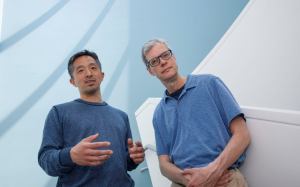
Stephanie Kayden, instructor in medicine at Harvard Medical School and Brigham and Women’s Hospital, took a philosophy course in Emerson 101 while a student at Harvard. Now, she’s at the front of that very classroom, teaching a course on humanitarian studies.
Katherine C. Cohen/Harvard Staff Photographer
A humanitarian comes home
HMS instructor teaches humanitarian studies in hall where she’d been a student
It was 1996, and Harvard senior Stephanie Kayden was sitting in Emerson 101, listening to Robert Nozick talk about philosophy. Kayden knew that studying philosophy was unusual preparation for medical school, but she wanted to sample something different before diving into medical studies.
Now, 15 years later, Kayden is an instructor in medicine at Harvard Medical School, an emergency physician at Harvard-affiliated Brigham and Women’s Hospital, and an authority in the humanitarian response to global disasters, both natural and man-made.
This semester, Kayden found herself coming full circle, spending her Wednesday evenings back in Emerson 101, but now standing at the front of the room teaching a course in humanitarian studies.
Kayden, an associate faculty member with the Harvard Humanitarian Initiative (HHI), said a scheduling quirk led the course, usually taught at the Harvard School of Public Health, to its Yard location. An unexpected surge in enrollment — 40 were expected but the total was nearly double that — left organizers scrambling for a room large enough to hold all the students. Emerson 101 was open.
Kayden has been around the world since those uncertain undergraduate days. She first went to New York to study at the Albert Einstein College of Medicine. She completed a fellowship in international emergency medicine at the Brigham, and now works in the emergency room, directing the International Emergency Medicine Fellowship.
Her humanitarian work has taken her to provide aid after the 2005 Pakistan earthquake that killed 75,000, and the 2010 Haiti quake that killed more than 300,000. Kayden played a key role in saving lives in Haiti, and was among the first wave of Harvard-affiliated physicians to arrive in the devastated capital, Port-au-Prince. Within days, she realized that another facility was needed to handle the steady stream of severely injured patients coming from the city’s makeshift trauma centers.
Kayden, together with Assistant Professor of Medicine Hilarie Cranmer, director of the Brigham’s Humanitarian Studies Initiative and an associate faculty member of HHI, scouted a site outside of Port-au-Prince, near Fond Parisien. Within a few days, the two organized a field hospital that would eventually grow to contain more than 300 beds.
Reflecting on the path that took her back to Emerson 101, Kayden was philosophical.
“I applied as a bio concentrator, but then realized I’d be spending a lot of time [with that subject]. So I decided to stock my soul with something much more in the humanities and expand my reach,” Kayden said. “It was a nontraditional course for a pre-med student. I found it makes me a more concise and pointed thinker. In the emergency room, it helps.”
The humanitarian studies class that Kayden teaches is designed to give a head start to students interested in a path similar to hers. The class, open to students from Tufts University and Massachusetts Institute of Technology as well as Harvard, provides an overview of the challenges faced in a humanitarian disaster. The course examines human rights law, health care, provision of food and nutrition, water and sanitation, and safety and security. It hammers the lessons home with a real-world simulation in a nearby state park each spring.




